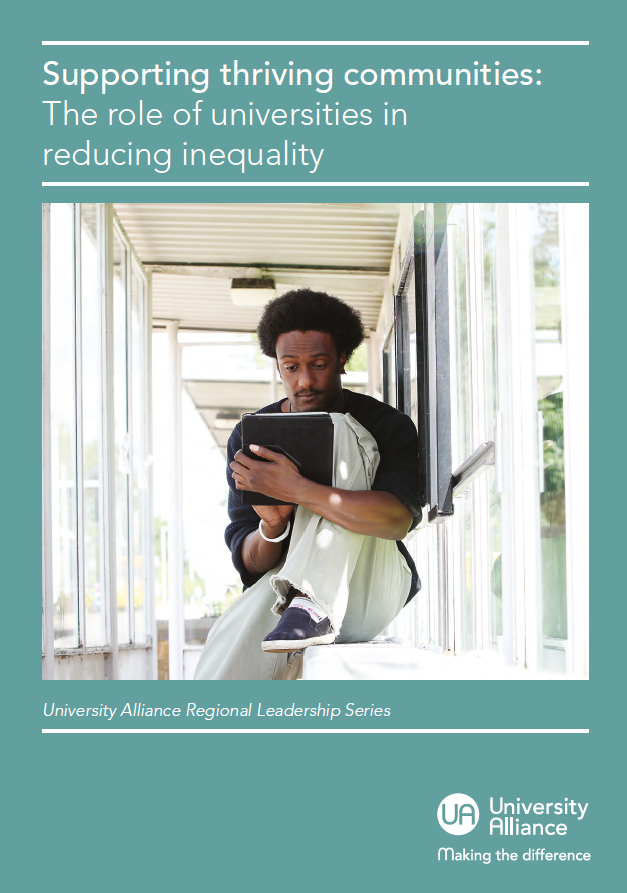Follow this link for case studies from Alliance institutions
The government’s ambitions for higher education to improve life chances will only be met if university leaders make tackling inequality a core part of their mission, argues a report published by University Alliance today.
Last month, the Social Market Foundation published a report on widening participation in partnership with University Alliance and the Open University, warning that the government’s target of doubling the proportion of disadvantaged students entering university could be missed.
Today’s report, Supporting Thriving Communities: The role of universities in reducing inequality, identifies strategies for success drawing on evidence from across the sector. It identifies collaborative outreach and working in partnership with schools as the most effective ways of supporting underrepresented groups to apply to university. It backs a continued strong role for the functions of the Office for Fair Access (OFFA) and bolstering the National Collaborative Outreach programme when the Office for Students comes into being.
The report goes beyond access to look at retention, progression and graduate success – and sets this within the context of universities’ wider contribution to tacking inequality in their cities and regions, which deserves to be recognised and championed.
For example, Kingston University has reduced its BME attainment gap by a third, including through the use of data analytics to track and monitor student engagement.
The University of Hertfordshire, through a series of targeted programmes, has seen its dropout rate for disadvantaged students almost halve, from 14 to 8 per cent, and the University of Greenwich’s programme focusing on care leavers has seen dropout rates fall from 30 per cent to 14 per cent.
These best practice examples demonstrate how the Prime Minister’s goals for access and attainment can be met in practice.
As well as buy-in from senior leadership teams, the report identifies embedding objectives throughout the whole university as important for success. This might lead to widespread changes to current practices and processes. Universities should also move away from a deficit model where a student is assumed to be ‘lacking’ certain skills or attributes to a model where the skills and attributes they bring are recognised. Interventions included unconscious bias training, adopting a more inclusive curriculum and increasing staff diversity.
Universities’ role in reducing inequality and creating life chances for all goes beyond student populations. The report highlights ways in which institutions are working with local communities to empower disadvantaged groups, tackle social issues and build resilience through research.
For example, Teesside University is working with Middlesbrough’s refugee population, which is the second largest in the UK. The University of Huddersfield’s community engagement work through cultural activities was awarded the Queen’s Anniversary Prize this year.
Commenting, University Alliance Chief Executive Maddalaine Ansell said:
“Universities will only be fully supporting social fairness when everyone with the ability to benefit from a university education has the opportunity to do so. This must go beyond “access” to include ensuring students are supported to complete their studies and progress to further study or a good job.
“We are proud to be the only group of universities that is above benchmark on both access and retention. As this report shows, we are also leading the way in showing how the Prime Minister’s targets on improving outcomes for black students can be met.
“As powers and budgets are increasingly devolved from Westminster and Whitehall, our universities stand ready to work with schools, businesses and local leaders to make cities and regions fairer places where everyone has the chance to succeed.”
Notes to editors:
- The report is the second in a series of University Alliance publications this year, focusing on the leadership role of universities as anchor institutions in cities and regions, working within wider ecosystems and responding to common real-world challenges in an enterprising, innovative and creative way. Join in the debate on Twitter using the hashtag #UACities. We have also published a series of case studies from Alliance universities here.
- The Prime Minister has set targets for doubling the entry rate from disadvantaged students going to university by 2020, compared to 2009 levels; a 20 per cent increase in the number of black and minority ethnic students going to university by 2020, with matched improvements in their completion rates and progression into work –https://www.gov.uk/government/speeches/higher-education-fulfilling-our-potential
- Widening Participation, published by the Social Market Foundation in partnership with University Alliance and the Open University on 23 March, is online here: http://www.smf.co.uk/publications/widening-participation
For press enquiries please contact Gabriel Huntley, Head of Communications and External Relations on 07890 626099 or email gabriel@www.unialliance.ac.uk .




